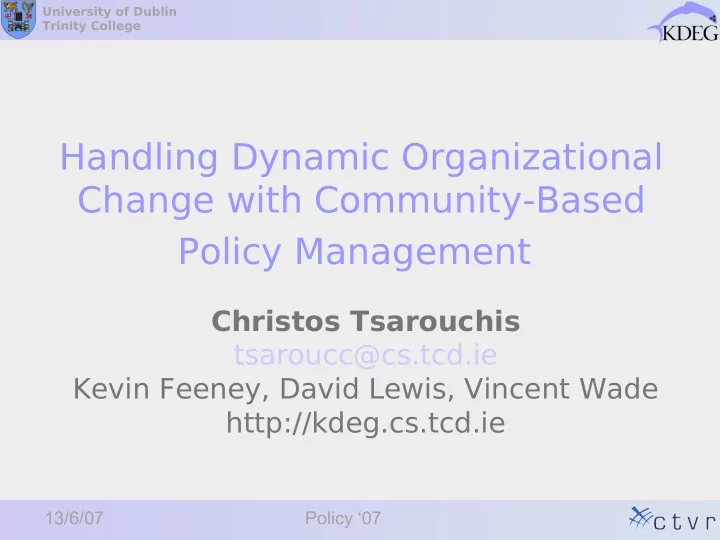

University of Dublin Trinity College Handling Dynamic Organizational Change with Community-Based Policy Management Christos Tsarouchis tsaroucc@cs.tcd.ie Kevin Feeney, David Lewis, Vincent Wade http://kdeg.cs.tcd.ie 13/6/07 Policy ‘07
University of Dublin Trinity College Outline Background on CBPM Rich-client interface design Dynamic Spectrum Allocation Use- Case Initial Usability Evaluation Future work 13/6/07 Policy ‘07
University of Dublin Trinity College Community-based management background Essentially a Meta-policy Management Framework Community: grouping abstraction instead of e.g. roles 13/6/07 Policy ‘07
University of Dublin Trinity College CBPM principles Divides Policy specification authority into a hierarchy of Communities Communities make policy authoring decisions within the envelop of authority granted to them • Resource management authority delegated from General to Specific levels Community members deal with localised policy set Community structure forms a progressively grounded model of the organisational structures involved 13/6/07 Policy ‘07
University of Dublin Trinity College CBPM main features Fine grained control over the distribution of authority Collaborative decision making Management of organisational change 13/6/07 Policy ‘07
University of Dublin Trinity College Rich-Client UI design Using CBPM principles Implementation • Java • Eclipse GMF (Graphical Modeling Framework) • Jboss Rules (drools) Rule Engine Use-Case • Dynamic Spectrum Access (DSA) using Software/Cognitive Radios ♦ Potential for spectrum to be allocated on a needs basis 13/6/07 Policy ‘07
University of Dublin Trinity College GMF-based Policy Engineering User Interface 13/6/07 Policy ‘07
University of Dublin Trinity College Policy Authoring Template 13/6/07 Policy ‘07
University of Dublin Trinity College UI features Drag ‘n Drop UI Easy to grasp hierarchy of authority Automatic conflict detection Assisted conflict resolution 13/6/07 Policy ‘07
University of Dublin Trinity College UI usability evaluation Dynamic Spectrum Access Scenario • DSA Policy Specification • Policy conflict detection/resolution Participants • 10 volunteers ♦ UML proficient ♦ Little knowledge of Policy Based Systems • Experiment lasted ~30 mins • Users asked to create a Community structure based on the DSA scenario, write policies, detect conflict and resolve conflict • Filled in a questionnaire 13/6/07 Policy ‘07
University of Dublin Trinity College UI usability evaluation contd. Results • 90% thought the interface was easy to use • Area with most difficulty ♦ Writing policies ∆ A little prior knowledge of policy based management was beneficial • Area with least difficulty ♦ Creating and understanding Communities • Things to improve ♦ Conflict notification system ♦ Use constrained menus for policy authoring ♦ … 13/6/07 Policy ‘07
University of Dublin Trinity College Future Work Experiment with more complex scenarios • feedback signals, trouble tickets Add Semantic Reasoning part • Use Semantically-enhanced Resource trees Further integration with CBPM Policy Decision Service Use semiotic analysis to analyse weak spots / areas where the users had difficulties 13/6/07 Policy ‘07
University of Dublin Trinity College For more information … http://kdeg.cs.tcd.ie Kevin Feeney, Christos Tsarouchis and David Lewis , "Policies as Signals in Collaborative Policy Engineering” PBAC 2007 D. Lewis, K. Feeney, D. O'Sullivan, “ Integrating the Policy Dialectic into Dynamic Spectrum Management ”, DySpan 2007 K. Feeney, D. Lewis, P. Argyroudis, K. Nolan, D. O’Sullivan, “ Grouping Abstraction and Authority Control in Policy-based Spectrum Management ”, DySpan 2007 D. Lewis, D. O'Sullivan, K. Feeney, J. Keeney, R. Power, “ Ontology-based Engineering for Self-Managing Communications ”, MACE 2006 , D. Lewis, K. Feeney, K. Foley, L. Doyle, T. Forde, P. Argyroudis, J. Keeney, D. O’Sullivan, “ Managing Policies for Dynamic Spectrum Access ”, AN2006 K. Quinn, A. Kenny, K. Feeney, D. Lewis, D. O’Sullivan, V. Wade, “ A Framework for the Decentralisation and Management of Collaborative Applications in Ubiquitous Computing Environments ”, NOMS 2006 K. Feeney, K. Quinn, D. Lewis, D. O'Sullivan, V. Wade, “ Relationship-Driven Policy Engineering for Autonomic Organisations ”, POLICY 2005 POLICY 2005 D. Lewis, K. Feeney, T. Tiropanis, S. Courtenage, “ An Active, Ontology-driven Network Service for Internet Collaboration ”, Workshop on the Application of Semantic Web Technologies to Web Communities at ECAI’04 D. Lewis, K. Feeney, K. Carey, T. Tiropanis, S. Courtenage, “ Semantic-based Policy Engineering for Autonomic Systems ”, WAC 2004 K. Feeney, D. Lewis, “ Community Based Policy Management for Smart Spaces ”, MUCS 2004 D. Lewis, T. O’Donnell, K. Feeney, A. Brady, V. Wade, “ Managing User-centric Adaptive Services for Pervasive Computing ”, ICAC 2004 D. Lewis, A, Brady, K. Carey, O. Conlan, K. Feeney, S. Higel, T. O’Donnell, D. O’Sullivan, K. Quinn, V. Wade, “ Managed Person-centric Adaptive Services for Smart Spaces ”, eChallenges 2004 K. Feeney, D. Lewis, V. Wade, “ Policy Based Management for Internet Communities ”, POLICY 2004 POLICY 2004 13/6/07 Policy ‘07
Recommend
More recommend